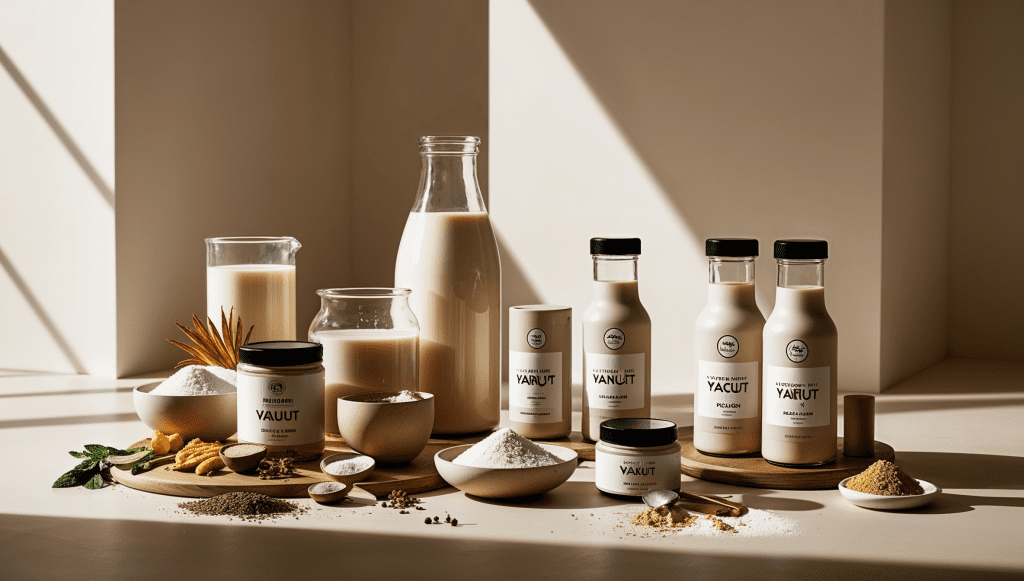To create a vegan version of a Yakult-style probiotic drink, you can use coconut milk and probiotic capsules instead of dairy. Here’s a simple recipe to guide you through the process.
Ingredients
- 1 (14-ounce) can full-fat coconut milk (preferably organic)
- 2 capsules of vegan-friendly probiotic (ensure they are capsules, not pills)
Optional Add-ins
- Sweeteners like maple syrup, agave nectar, or stevia
- Vanilla extract or vanilla bean powder for flavor
Instructions
Prepare the Coconut Milk:
- Shake the can of coconut milk well to ensure it’s mixed. Pour it into a clean, sterilized glass jar or bowl. To sterilize, rinse the jar with boiling water and let it cool completely.
Add Probiotics:
- Open the probiotic capsules and pour the contents into the coconut milk. Use a wooden or plastic spoon to stir gently until well mixed. Avoid using metal utensils as they can negatively affect the probiotics.
Fermentation:
- Cover the jar with cheesecloth or a thin dish towel to allow air in while keeping contaminants out. Secure it with a rubber band.
- Place the jar in a warm area (around 75°F to 85°F) for 24 to 48 hours. The longer it ferments, the thicker and tangier it will become.
Flavoring (Optional):
- After fermentation, taste your yogurt. If desired, add sweeteners or vanilla extract and mix well.
Storage:
- Transfer your coconut yogurt to an airtight container and refrigerate. Use within one week.
Best Non-Dairy Milks for Vegan Yakult
When creating a vegan version of Yakult, several non-dairy milks can serve as excellent bases:
- Coconut Milk: Rich and creamy, coconut milk provides a luscious texture and flavor, making it a popular choice for vegan yogurt-like drinks.
- Almond Milk: This milk has a mild flavor and is lower in calories. It works well but may require thickening agents to achieve a creamier consistency.
- Soy Milk: With a protein content similar to cow’s milk, soy milk is a great option for achieving a thicker texture. It also has a neutral taste that complements probiotics well.
- Oat Milk: Creamy and slightly sweet, oat milk can add a pleasant flavor while also being environmentally friendly.
- Cashew Milk: This milk is creamy and rich, perfect for those who prefer a thicker drink.

Using Probiotic Powder Instead of Yakult
Yes, you can use probiotic powder instead of Yakult for a vegan version. Look for vegan-friendly probiotic powders that contain live cultures, such as Lacticaseibacillus casei or other beneficial strains. This allows you to create your own probiotic drink without dairy while still achieving the desired health benefits.
Natural Sweeteners for Vegan Yakult Recipe
Several natural sweeteners can enhance the flavor of your vegan Yakult:
- Maple Syrup: Adds a rich sweetness with a hint of caramel flavor.
- Agave Nectar: A mild syrup that dissolves easily and has a lower glycemic index than sugar.
- Coconut Sugar: Offers a subtle caramel flavor and is less processed than white sugar.
- Stevia: A calorie-free sweetener derived from the leaves of the stevia plant, suitable for those looking to reduce sugar intake.
- Date Syrup: Made from dates, this syrup provides natural sweetness along with additional nutrients.
Fermentation Time for Vegan Yakult
The fermentation time for vegan Yakult typically ranges from 24 to 48 hours. The exact time depends on the ambient temperature and the specific probiotic cultures used. Warmer temperatures may speed up fermentation, while cooler conditions can slow it down. It’s essential to taste the mixture periodically to achieve your preferred tanginess and thickness.
This recipe yields a creamy, tangy vegan yogurt that can be enjoyed on its own or used in smoothies, desserts, and breakfast bowls.












